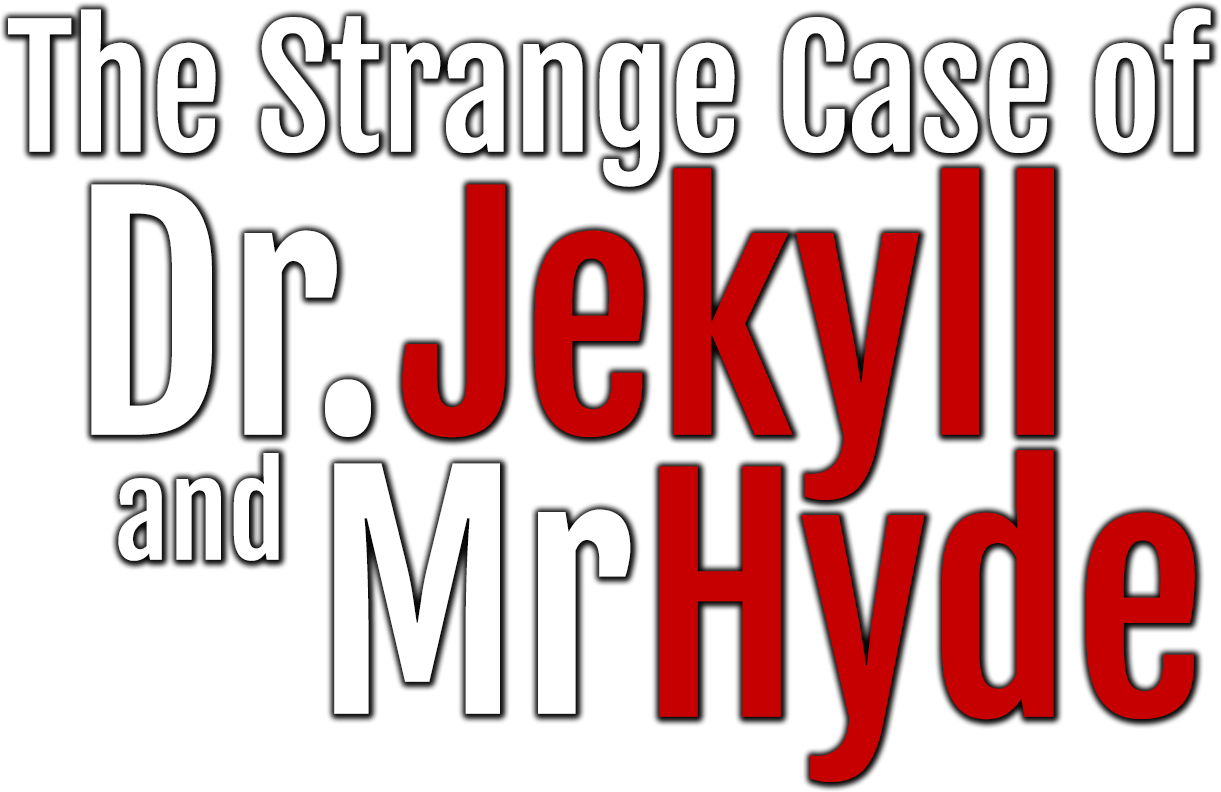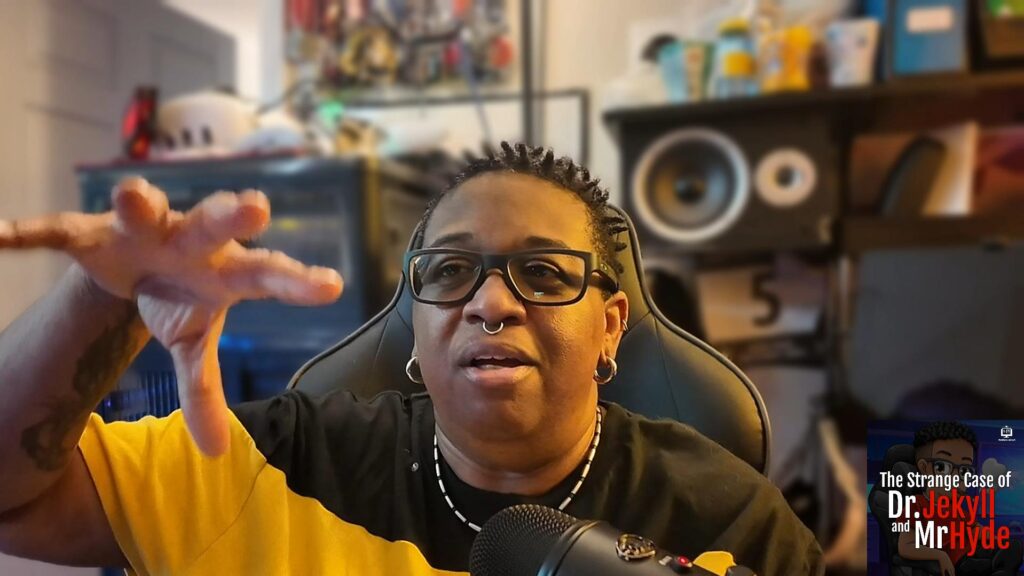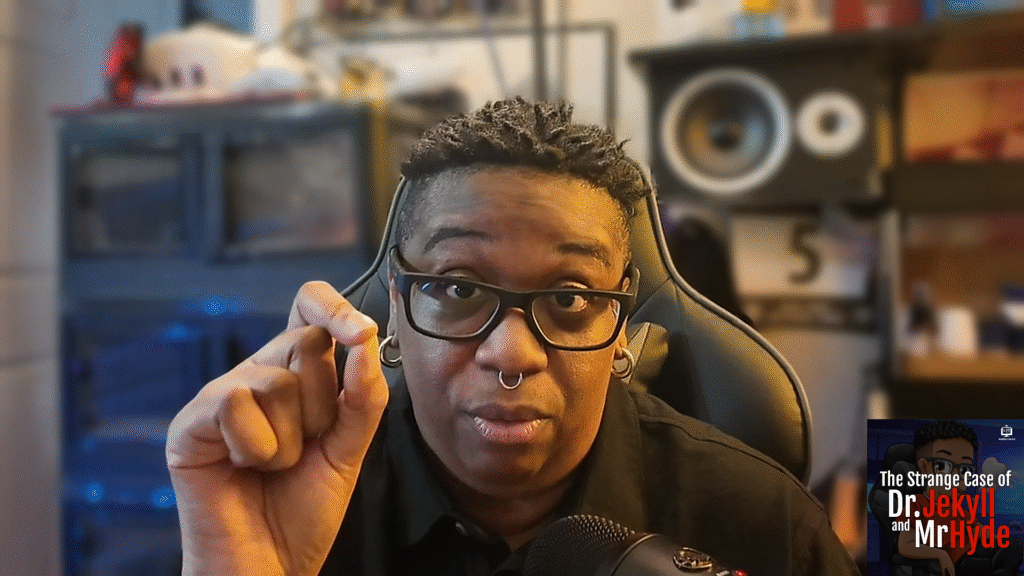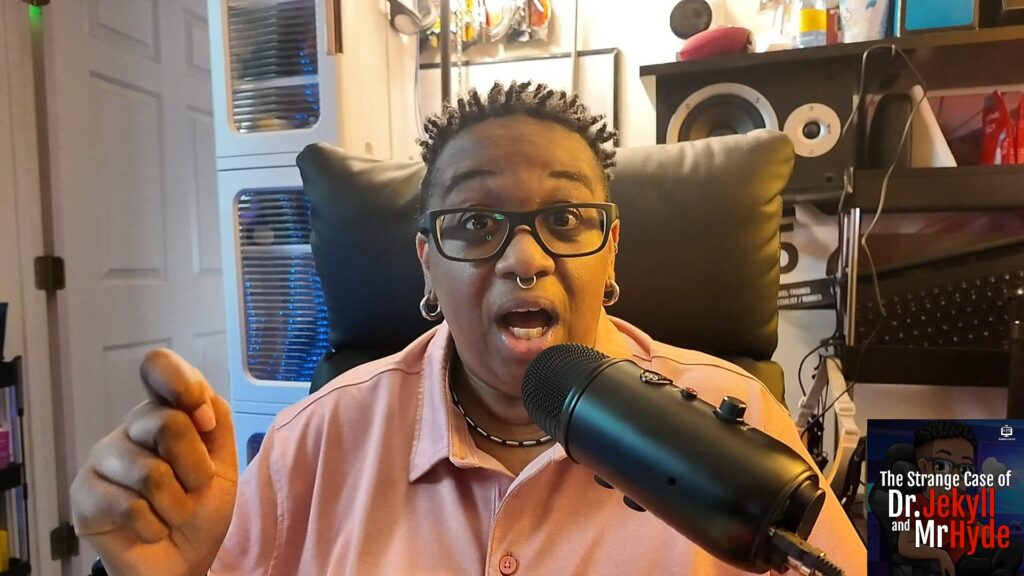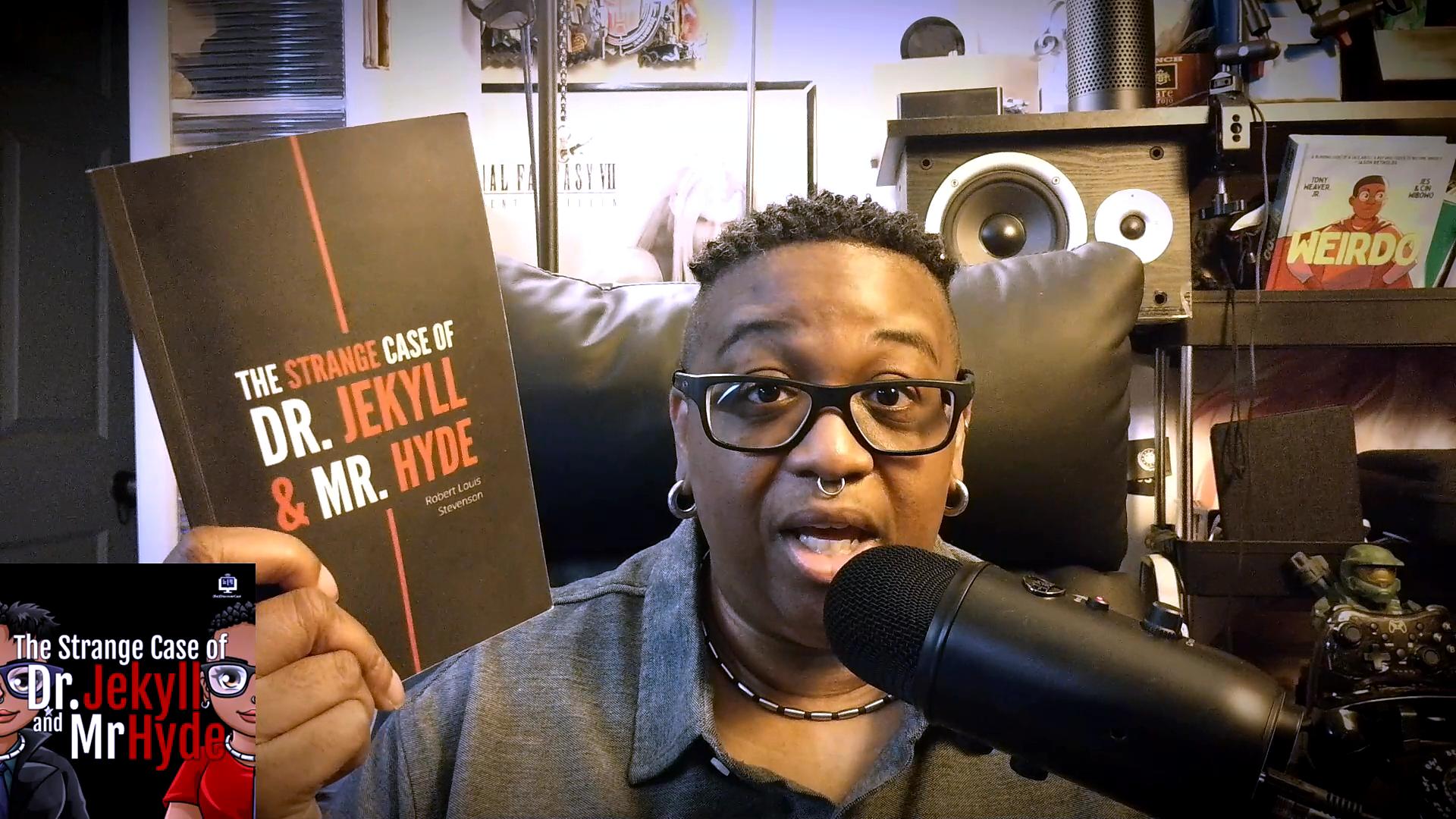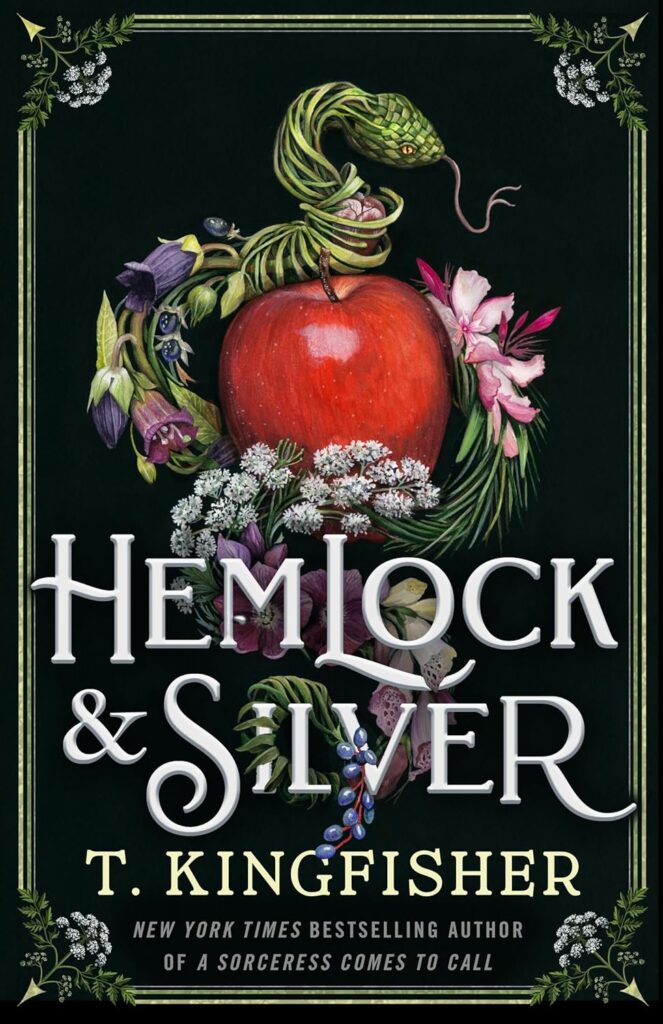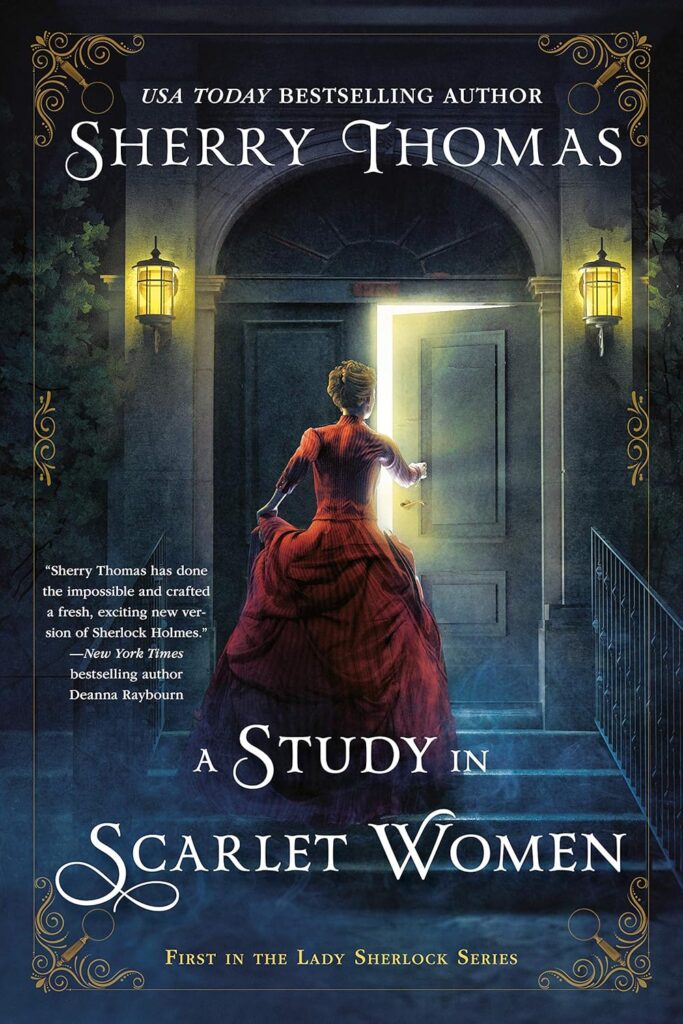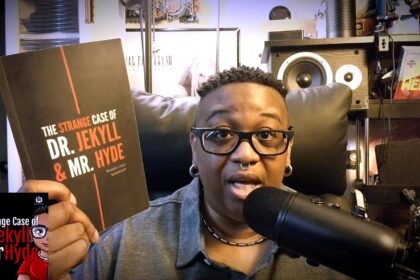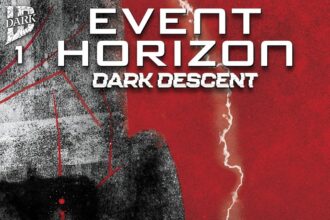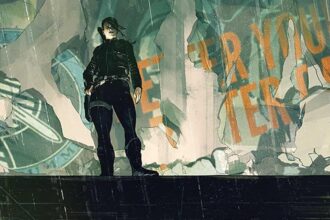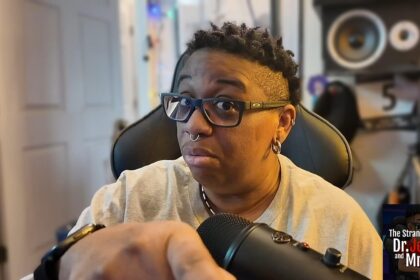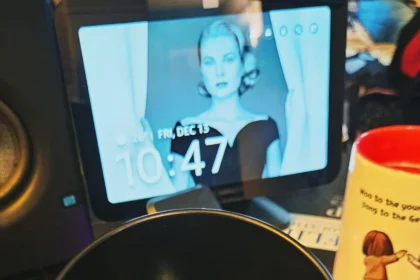Summary
Elaine discusses The Strange Case Of Dr Jekyll and Mr Hyde - Chapter 5 (Part 1)
Watch on YouTube > https://youtu.be/Ce0WsS1td0A
The Incident of the Letter

This is one of the chapters that I kind of wish Stevenson’s wife had permanently destroyed. It’s the most contrived, forced, lazy chapter of the whole book. The entire chapter exists to push evidence to the reader that is barely necessary.
I do spend a large chunk of time (the first 20:14 minutes) at the beginning further explaining how my aphantasia effects my ability to perceive mood sometimes in books. I explain how I basically do what AI does … I pull existing information from movies and other media that I have seen (The Frankenstein Chronicles, The Wolfman, Young Sherlock Holmes, Vienna Blood) that closely matches whatever is being described by the author. It doesn’t always give the exact mood or scene but it’s as close as I can get.
The rest of the video (from 20:15 onward) is ALL about why the chapter sucks but the best part about this trash chapter is we get even more information about how amazing, honest, smart, and invested Utterson is in getting to the bottom of this mystery … even if it means questioning and investigating his friend whom he so cares for. This is why Utterson’s perspective is so interesting and worth knowing and exploring.
Episode Transcript
[00:00:03] Welcome to Elaine is Reading the strange case of Dr. Jekyll and Mr. Hyde, episode nine, chapter five, part one. I want to take a moment to say thank you for listening to my podcast. I really, really appreciate it. I spent a lot of time in this episode talking about how my aphantasia affects my ability to enjoy books. It’s very educational, but skip ahead minutes if you just want to hear me talk about the chapter.
[00:00:48] All right. Hey, everyone. Welcome back to another episode of Elaine is Reading. Don’t even laugh. That’s what it’s called. Elaine is Reading or recluse reads. Also, some people have. Have said. And I. I was using. I decided to use that for my TikTok recluse reads, which is, I think, actually better than Elena’s reading. But whatever.
[00:01:12] I like the name I’ve come up with. I don’t care anymore. All right, so we are.
[00:01:19] We’re on chapter five, right? Yes, chapter five of Jekyll and Hyde.
[00:01:30] It is called the Incident of the Letter. And this chapter is probably the chapter I hate the most in the book.
[00:01:40] I just think that it’s really, really contrived and just.
[00:01:52] I don’t know what the word is. I mean, there’s a lot of books that I read that have, like, this kind of mechanic in them where they’re trying to give you some information.
[00:02:05] And there’s only really two ways of giving the reader that information.
[00:02:09] A lot of exposition coming from another character or setting up scenario specifically to give the information to the reader. Like a random scenario where all of a sudden this information is given.
[00:02:27] I’m not saying that, you know, random situations don’t happen and that information isn’t presented through those random situations. But sometimes it can be really jarring in a book that up to a certain point has relied more on sort of giving you hints and clues and letting the reader kind of follow breadcrumbs and slowly, like, revealing things to you or not, and, like, you kind of have to figure them out on your own.
[00:03:01] Jekyll and Hyde is a little bit strange, I’m finding, going through this.
[00:03:10] The beginning of the book was, let me see, like, the first.
[00:03:17] I think the first three chapters of the book, which is like up to page 23 or so.
[00:03:25] It was really sparse.
[00:03:28] Like, it was a lot of heavy dialogue act, a lot of action, but not a lot of deep descriptive sections that, like, sort of set the mood and things like that. It didn’t have a lot of.
[00:03:48] I don’t want to say a lot of words, just cut a Few. And it’ll be perfect. It did have a lot of words, you know, but like after chapter three, especially chapter four and chapter five, there’s a lot of description. And I don’t mean overwhelming to the point where you want to skim pages, because the, you know, the chapters are only like five pages long, but there’s a lot of long paragraphs that are describing the city or the lights of the city or the ambiance of the scene.
[00:04:22] And it’s like.
[00:04:24] It’s strange. It’s almost like it’s two different authors. And I. I don’t mean that like so heavily literally. I just mean it’s almost like you can sort of feel the change in the way that the story is written. Like, the first three chapters are kind of like, let’s get this out of the way. And then after that it becomes let’s more set a tone or set a move.
[00:04:50] And I believe it might be because there were a couple of versions of this story.
[00:05:02] Thanks to ML Clark for sending me some information about the author and the novel. I don’t tend to look up information about the author or any kind of critiques of novels and stuff because I don’t care what people think. And I don’t want to be influenced by what, you know, overly educated people are trying to tell me the story is about. I want to have my own experience with it. So I didn’t have any background about the novel at all.
[00:05:31] But the information that I read was about how Robert Louis Stevenson’s wife, I guess, thought the book was trash or was really bothered by the fact that he was writing it because she thought it was just not good and that he shouldn’t be trying to publish it or something. And she took it and she burned the first draft or she burned a chunk of it.
[00:05:51] So I don’t know if he had to rewrite it or whatever. But it seems like there’s two different types of writing styles in this. It seems like maybe she burned the beginning, like when he was submitting it, and she was like, this is trash, and burned it. And then he had to rewrite it and kind of. It feels very rushed and kind of quickened to the point. And that’s not a bad thing. I actually like things like this because I don’t.
[00:06:16] I don’t.
[00:06:17] I don’t gravitate towards things that are really, really wordy and heavy on description. As I said in previous videos, since I have Infantasia and Fantasia, Aphantasia and Fantasia, Anaphantasia and Fantasia, A Fantasia Anastasia, Fantasia. I have. I have a combination of Fantasia and Anastasia.
[00:06:52] I don’t know. Since I have Aphantasia, it’s really difficult for me to get engrossed in things that require me to conjure up new visual information.
[00:07:04] Everything that I’m picturing is a conglomeration of things I’ve already seen.
[00:07:11] So if you’re telling me that I need to picture or the book is saying, like it’s a dark alley or something, with shadow street, you know, street lanterns or, you know, in sort of the Victorian sort of Gothic. I’ve seen movies that take place in time periods like that. So I’ve seen set pieces of long cobblestone alleys in London with, you know, lighted torches and stuff from different kinds of movies. So that’s what I picture. That’s what I.
[00:07:41] I see.
[00:07:42] It may be highly inappropriate as far as being not, you know, the bright period of time or whatever, but I can only pull from my existing memory and pull out those placeholders.
[00:07:54] So if there’s something that’s new that I haven’t seen in a movie or a picture of or something like that or in a TV show, then I don’t really have a visual reference for it, and I’m incapable of making one up.
[00:08:09] I don’t think people who.
[00:08:12] Who don’t have this can understand how really inconvenient that is sometimes. And I also think a lot of people already do this and they don’t know that they are pulling from memory. Like, they think they’re making something up. They think they’re creating a new visual when in fact they’re actually pulling from their memory. And people do this so quickly that they don’t realize that they are doing that. I think a lot more people have aphantasia that realize that they do because so many people rely on memory to create pictures, and that’s normal. But if you can’t create pictures without it, if you can’t create something completely new, something that you don’t have a visual reference for, a lot of people don’t realize they can’t do that until they challenge themselves to or until they’re tested for it.
[00:09:07] So when a book is heavy on descriptions, mood lighting in order to create a scene, I don’t always see that scene. I don’t always have the same feeling that the writer is trying to give me because I can’t put the scene together in my mind.
[00:09:29] That definitely takes away from, I think, my ability to enjoy certain types of literature.
[00:09:39] I don’t think that it takes Away from my ability to understand all the literature. Because while I think mood is important and setting a scene is important, I think what’s more important is me understanding the words that are being spoken by the characters. And the words that the author is telling me about the characters and what they’re doing or feeling.
[00:10:01] So I don’t think I miss a lot when it comes to books.
[00:10:05] But I do think that I am not necessarily as pulled into those moods or those. Those scenes as much as another person might be, like, engrossed in something that’s setting up a very emotional or psychological sort of tone or mood. I think I do miss that part of reading.
[00:10:32] Audiobooks help a lot. Because an actor can make me feel the mood sometimes in how they’re narrating in their voice. And the inflections and intonations and all those types of things that they use to bring the characters to life.
[00:10:56] And that can make me feel a certain way. So, like, if the reader is reading something and the voice gives me the feeling of what the mood is like. And I think that’s the difference between someone who just reads or just narrates and an actor who is creating something through the use of their acting skills and their vocal skills. That helps the book come to life for me. And it makes a huge difference. I don’t have to picture it. I don’t have to sit there and try to fill that spot in my mind. I can. The person’s voice is making me feel a certain kind of way.
[00:11:37] So the last two chapters of Jekyll and Hyde have been heavy on a lot of description. I think for the purpose of mood. I think for the purpose of giving you a feel for the city, feel for Jekyll’s home.
[00:11:54] And I.
[00:11:58] I have a hard time with it.
[00:12:01] But I liken a lot of things to, as I said, stuff I’ve already seen.
[00:12:10] There’s a description in this chapter about where Dr. Jekyll’s office is located.
[00:12:21] Utterson is brought in and he’s. He’s brought through the front door.
[00:12:27] And he’s never met Jekyll in this particular location in the house. I think he always meets him in the study or a lounge that he has off of one of the hallways.
[00:12:36] But Poole brings him downstairs. And you get the first kind of understanding how Jekyll purchased this house from the heirs of a celebrated surgeon. So it has all these different areas to it. And downstairs it has an operating theater. And off the operating theater are a couple of doors and his office or, you know, his Private office is through one of these doors off of this old operating theater. And they just, you know, it’s very well described.
[00:13:13] It says, you know, he gazed round with a distasteful sense of strangeness as he crossed the theater, once crowded with eager students and now lying gaunt and silent.
[00:13:26] And that description by itself for most people is probably something that they can picture. I picture a lot of movies and TV shows. In fact, I think I just recently. Not recently, but it’s recent in my mind. I saw.
[00:13:45] I want to say it was a.
[00:13:48] A new television version of.
[00:13:53] Was it Frankenstein?
[00:13:59] I think I want to say it was a new Franken. A version of Frankenstein. A new version of Frankenstein. And I don’t know if it was a. I think it was a movie.
[00:14:11] And there was a scene where the guy is.
[00:14:17] It must have been Frankenstein because he’s animating a dead body. And everyone in the operating theater is completely, like, disgusted by this. That’s where that gift comes from, Corey, that, that I had Lawrence make where he goes, get on with it. That, that one. I think it’s from that. A new. It was a new Frankenstein or something.
[00:14:38] And I picture that very clearly like this.
[00:14:44] The, the, you know, where the, the thing is in the middle and it’s a big, like, amphitheater type circular thing where all the students look and they look down and, and watch it.
[00:14:57] I think a recent episode I watched of.
[00:15:01] Well, recently I watched an episode of Vienna Blood, that British show about the student of Freud who works with the detective to solve stuff.
[00:15:14] And there was a similar scene with the guy doing electric shock therapy on a woman. And, you know, so that the bottom is sort of recessed and like the students look down into it. So I’ve seen that a few times. I’ve seen that in a bunch of movies a bunch of times.
[00:15:33] That werewolf movie, the new, you know, what was it called? Not werewolf in London, but it was a new sort of werewolf movie where the guy, I think, either transforms in the middle of that sort of amphitheater. So I’ve seen that style of room before in many movies. When they’re describing this room, I see that scene from the Frankenstein movie because I remember it very clearly and I thought it was sort of hilarious the way that that scene played out. And I remember all the people looking down, you know, from these, these seats. And I. And I actually thought at the time that would be a cool way to kind of learn. Like, not necessarily sort of staring, like everybody’s like in their seats staring at the professor or whatever. But like, you’re kind of in a round kind of area and you’re looking down and you can kind of see everything more clearly. I always thought that would be kind of a cool, you know, way to observe a lecture or something that you’re learning.
[00:16:49] So this particular part of the book I was able to pull from things I already knew. And I could picture that back door off the side that he goes through. And he, you know, he goes into this large room and the room is described. Even like the first two pages of this chapter are just descriptions of where Jekyll lives and how Utterson is being taken to someplace he’s never been before in the house. And he’s meeting Jekyll in this location that is very dim and very dreary. And there’s a fireplace and he’s kind of sitting in front of the fireplace and he’s very sickly looking and he, you know, very feverish and he doesn’t look well. And the whole place is sort of.
[00:17:41] It said like that there’s. There’s fog even. Like, the houses develop fog in. In London. Like the. It seeps in through the windows and stuff. So it’s kind of a foggy room. It really sets the tone for this conversation where he’s sitting and huddled in front of the fire and it’s. There’s a couple of candles, you know, it’s. And there’s fog sort of hovering in the room. And I think if you can picture things like that, it gives you.
[00:18:10] I think it gives most people an even stranger feeling, like, when they start reading it, because they can picture the conversation taking place in that area.
[00:18:20] For me, I can picture all the elements. Candles, fireplace, guy sitting in front of fireplace.
[00:18:31] Again, I have seen men sitting in front of fireplaces before, like in blankets, you know, or like feverish or not well, sitting in front of fireplaces. The first thing that comes to mind is a scene from Young Sherlock Holmes where they’re talking to this old guy who’s not well, or he’s been drinking and he’s sitting in front of a fireplace and he’s recounting something that happened to him. And he’s very sweaty and he’s got a blanket on him around his shoulders. I picture that. So I see.
[00:19:07] Even though it’s like a movie and it’s a separate thing, I picture that when they’re describing how Dr. Jekyll is sitting in front of this fireplace and he’s not well.
[00:19:17] So I can get the same feeling from the description, even though it’s not exact what the author is telling me. I’m pulling from movies that have had the same imagery. And in that imagery I can then get same feeling. So it’s not exactly the same, but it’s as close as I’m able to get. And I think that I can get the same feeling from this scene by putting together all the different elements that I have in my memory. It’s not the same as creating your own, but I don’t think I’m missing out on anything in my ability to do that.
[00:20:07] So there’s.
[00:20:11] I said I don’t like the scene very much because it feels really contrived and.
[00:20:17] But there is something that I do like about it, and that’s kind of what I want to focus on.
[00:20:25] So Utterson goes to visit Jekyll. This is after the whole Hyde beat to death, this guy in the middle of the street.
[00:20:39] He goes to see Jekyll, obviously, because, I mean, this has now gotten.
[00:20:45] This has gotten out of hand, let’s just say, right? So he’s gone to see him, order to talk to him about this. At this point, we can’t keep sort of skirting around this issue.
[00:20:58] We got to talk about it, kind of visit, that kind of thing.
[00:21:02] So he meets him.
[00:21:03] Poole brings Utterson down to Jekyll’s office. And Jekyll is not well, like he’s described as saying.
[00:21:12] He says he did not rise to meet his visitor, but held out a cold hand, bade him welcome in a changed voice.
[00:21:21] So he’s. Jekyll’s not well.
[00:21:24] But the first thing Utterson says, despite this, he says, and now you’ve heard the news.
[00:21:32] Like, the dude is sitting there, like in front of the fireplace. He’s not well. He can’t even get up to greet him. His voice has changed, and he’s just like, oh, come sit down kind of thing. And Utterson’s like, so have you heard the news that your man Hyde killed somebody? Like, he’s not even interested in how Jekyll appears. He is straightforward about what’s going on.
[00:21:54] So the doctor says, yes, he’s heard it. And he heard people, you know, the newsboys, you know, yelling about it in the street.
[00:22:03] And Utterson says, look, Carol was my client, but so are you. And I want to know, are you hiding this guy? Because remember, they can’t find Hyde after the murder. So he’s like, look, just tell me what the fuck are you hiding this dude? What are you doing?
[00:22:22] And Jekyll’s like, I swear to God, I Swear to God, I will never set eyes on him again. So he’s basically saying, the dude is gone. You do not have to worry about this.
[00:22:34] I’m absolutely done with him. You won’t hear any more about him. And I like that. This is enough, right? This guy has actually murdered somebody, brutally. And Jekyll’s like, no, I’m not hiding him. But don’t worry, you won’t hear from him again. He’s gone.
[00:22:52] Okay.
[00:22:54] And Utterson says, you seem pretty sure of him, and for your sake, I hope you may be right. If it is to come to a trial, your name might appear so. Again, Utterson cares both about his friend and as a lawyer. He’s saying, look, if you get involved in this, or, you know, he’s been saying this since the beginning. If you get caught up in this, it’s going to ruin your reputation. It’s already like hurting your reputation that you’re associated with this guy. I don’t want anything bad to happen to you. Can we talk about this? Like, the whole time he’s been trying to help his friend, both as a friend and lawyer, right? The lawyer part of him is, look, your reputation, if your name comes up, this isn’t going to be good, that you’re associated with this guy. That kind of stuff. And as his friend, he’s also been saying to him in previous chapters, can you just talk to me? Can you tell me what’s going on? If you tell me what’s going on, I can help you out of it. That kind of thing. So I, like Utterson. I’ve said this from the beginning. I really do like him. And I think that he’s really trying to do his best for his friend and also to do the right thing.
[00:24:00] Jekyll assures him, look, he’s gone. I, you know, trust me, you know, you’re. You’re not gonna.
[00:24:09] You’re not gonna see anything more of him, that kind of thing.
[00:24:14] And he says, and this is like the weird thing that, that he says. He says, you know, have this letter.
[00:24:24] This is the thing that just takes me right out of the book.
[00:24:28] And this happens in any book or movie or TV series or whatever. When someone, when these scenes come up, I’m kind of like, now the writer or author or whatever is really trying to tell us something. They’re really trying to push a plot, you know, a plot element ahead by just throwing it at you because they don’t know how else to give it to you. I just really don’t like stuff like that.
[00:24:53] So he says, well, I’m sure he’s gone. You don’t have to worry about him. And I have this letter. He’s like, I’ve received a letter, and I’m. I’m not sure if I should show it to the police.
[00:25:05] So I’m gonna leave it with you because you, you know, you would judge wisely, and I have great trust in you.
[00:25:12] And Utterson is a little, you know, he’s like, you fear, I suppose, that it might lead to his detection.
[00:25:19] And he’s like, no, no, no, no. I don’t care about Hyde. This has nothing to do with him. I was thinking of my own character, which this hateful business has rather exposed.
[00:25:31] Utterson ruminated a while. He was surprised at his friend’s selfishness, yet relieved by it.
[00:25:38] Well said. He. Let me see the letter.
[00:25:41] I like this line, like, because the whole time he’s been dealing with Jekyll. Jekyll has been like, don’t worry about it. I have a great interest in Hyde. He’s. He’s someone who, you know, is under my care. And if anything happens to me, I would appreciate if you took him under your care. Like, he’s been sort of treating him, like I said, like a child like this. Like, illegitimate child of his or something. Like, he’s, you know, someone who he cares about, and he wants Utterson to care about. And he’s like, if you understood everything, you would care about him. That kind of suggestion.
[00:26:18] And now he’s kind of like, look, whatever this guy’s done, it’s affecting my reputation. So I want you to help me with it. Now, like, all of a sudden, he’s got a change of tune. Where all of a sudden, now it’s not like, oh, don’t worry, don’t worry. You know, I can be rid of him anytime. And, you know, now he’s like, oh, my reputation. My reputation. So I like that. Utterson is like. He’s like, what’s up with that? But at the same time, he’s kind of happy. Because at least it shows that Jekyll is taking this seriously. His friend is taking this seriously. This is not just, you know, a little bit of a rumor. This is something that can affect your very prestigious career, right?
[00:27:00] So the letter. Basically, the letter is alluded to. It’s not written out here, but basically it’s like, oh, you know, Dr. Jekyll has helped me so much.
[00:27:15] You know, I so unworthily repaid for him for a thousand generosities.
[00:27:21] Don’t worry about him. At all.
[00:27:24] I’m leaving, I’m never coming back kind of thing. Like, that’s literally what, you know, is implied in the letter.
[00:27:33] Don’t worry about Jekyll. No harm is going to come to him. I’ve disappeared and he’s helped me so much and I’ve repaid him terribly. What an awful person I am. Kind of letter. And it’s like the perfect letter. It’s the perfect letter to, you know, alleviate any doubt that anybody might have about Jekyll and Hyde’s associations with each other.
[00:27:56] It’s really.
[00:28:00] It’s so contrived. It’s really.
[00:28:03] Anybody who believes this letter is a fool, a complete and utter fool. And I like that Utterson doesn’t buy it.
[00:28:13] I like that Utterson does two things.
[00:28:19] He asks about the letter and he seeks somebody else’s advice about something that he feels is suspicious about the letter, like immediately. He doesn’t sit on it. As much as he’s a friend to Jekyll, he’s also a lawyer. And he’s like, well, this letter is great and all, but I love that about him because, yes, he is a good friend, but he’s not stupid.
[00:28:48] He’s interested in what’s going on. He wants to get to the bottom of what is happening. But he’s not going to be just fooled and led into some bullshit. He’s a lawyer.
[00:29:01] So I love this.
[00:29:03] I hate this chapter, but I love this about Utterson. It shows so much his personality and the part of his personality that I really like. He cares.
[00:29:15] And he’s willing to go through some shady business and do some questionable things to show that he cares, like stalking Hyde and like trying to learn more about him on his own and stuff like that. I love that he’s willing to go through these lengths, but I also love that he’s not so trusting.
[00:29:33] He’s not just a pushover. He’s not someone who’ll stand by his friend no matter what without questioning him and without saying, are you sure you should be doing this? Or can we talk about this some more? Because I don’t think this is a good idea. He’s that kind of friend, right?
[00:29:49] There’s something to be said for someone who won’t just accept your word when he feels that it’s not in your best interest.
[00:29:59] He’s not worried about his reputation as a lawyer for representing Jekyll. That’s not the issue. He’s worried about Jekyll. He’s worried about the things that Jekyll has been blackmailed into doing or whatever by hyde and he wants to get to the bottom of.
[00:30:17] Doesn’t mean he doesn’t trust jekyll. I think it just means that he doesn’t trust that his friend hasn’t been manipulated in some way or, you know, pressured or blackmailed or whatever, and that he may not be in his full right mind.
[00:30:34] That’s what I like about him. He cares. He. He genuinely cares and therefore isn’t going to fall for any bullshit.
[00:30:43] So he reads the letter, and it says, the lawyer liked the letter well enough.
[00:30:49] It put a better color on the intimacy than he had looked for. And he blamed himself for some of his past suspicions.
[00:30:59] So he reads the letter, and he’s kind of like, okay, maybe.
[00:31:02] Maybe I was wrong about what I thought about hyde. Maybe, you know, he’s not as bad.
[00:31:11] And then the next thing out of his mouth is, have you the envelope?
[00:31:17] Like, those two things happen right after each other.
[00:31:23] On the one hand, he reads the letter and he’s like, oh, you know, this letter clears a few things up.
[00:31:29] And at the same time, he’s like, I may have been wrong about what I thought of hyde.
[00:31:35] And then in the very next second, he’s like, do you have the envelope?
[00:31:40] If he had just taken it for what it was, you know, if he just read it and been like, thank God for this letter, it clears up everything. I’m gonna go with this letter and figure out what to do, Whether to give it to the police or whatever, but at least, you know, I feel better about you and hyde from reading it. He doesn’t leave it at that.
[00:31:58] He asks for the envelope.
[00:32:02] He doesn’t need the envelope. He can just leave.
[00:32:05] He can just take jekyll at his word and walk right out the door, and he doesn’t. And I love that those two things follow each other so quickly. He blamed himself for some of his past suspicions.
[00:32:20] By the way, do you have the envelop?
[00:32:25] I love this guy.
[00:32:27] I love this guy. This guy needs more love and more attention.
[00:32:32] And jekyll says, of course, I burned it before I had thought what it was about, but it bore no postmark.
[00:32:42] The note was handed in.
[00:32:47] Shall I keep this and sleep on it? Said utterson.
[00:32:50] I wish you to judge for me entirely was the reply. I have lost confidence in myself, so I just. It makes me so intensely happy. Like, I just love utterson at this. At this moment. I like him so very, very, very much for the type of person he is and the type of person that Stevenson is telling us he Is the way that he goes about this whole process of trying to figure out what’s going on. That is such an interesting story to me, and I don’t know why everybody ignores it. I don’t know why everyone just leaves this one person’s perspective out of everything that they do. I get that. Maybe they don’t think it’s very interesting. Like, who cares about Utterson? Who cares about what this lawyer is doing to figure out the story?
[00:33:48] All we care about is Hyde killing somebody and Jekyll turning into this creepy guy and all this stuff. I don’t care about that stuff.
[00:33:57] I care about this one guy who is working so hard to figure out what’s going on with his friend and get to the bottom of this mystery. I think that’s so interesting. I think that’s very compelling. Especially because he’s not an idiot.
[00:34:14] He’s not someone who you just lie to his face. And he goes about his business and says, thanks for clearing that up, and goes home. I like that he asks questions. He seeks advice. He looks over things. I’m not sure about this. Let me go investigate. He’s literally out there Sherlock Holmesing this thing by himself.
[00:34:36] And the perspective of someone who cares about somebody, but at the same time is suspicious of them, is worried about them and wants the best for them, but at the same time considers that they might be lying.
[00:34:54] Like that, you know, relationship and sort of trying to deal with the uncertainty of that kind of relationship is so interesting to me. And I think that that makes a compelling story and a compelling thing to watch, because you have to watch this guy watch his friend and go, I’m not sure that I trust my friend. I’m not sure that Jekyll is okay. I’m not sure that he’s in his right mind. He might be lying.
[00:35:29] But at the same time, you’re like, you want to trust this letter? You want to be like, oh, thank God, you know, this letter clears everything up.
[00:35:37] But does it, though?
[00:35:40] I like that difficulty. I like that we’re being shown this man trying to figure out, you know, all of these different aspects and trying to deal with these different emotions that he feels.
[00:36:01] End of part one. Thanks for listening.
